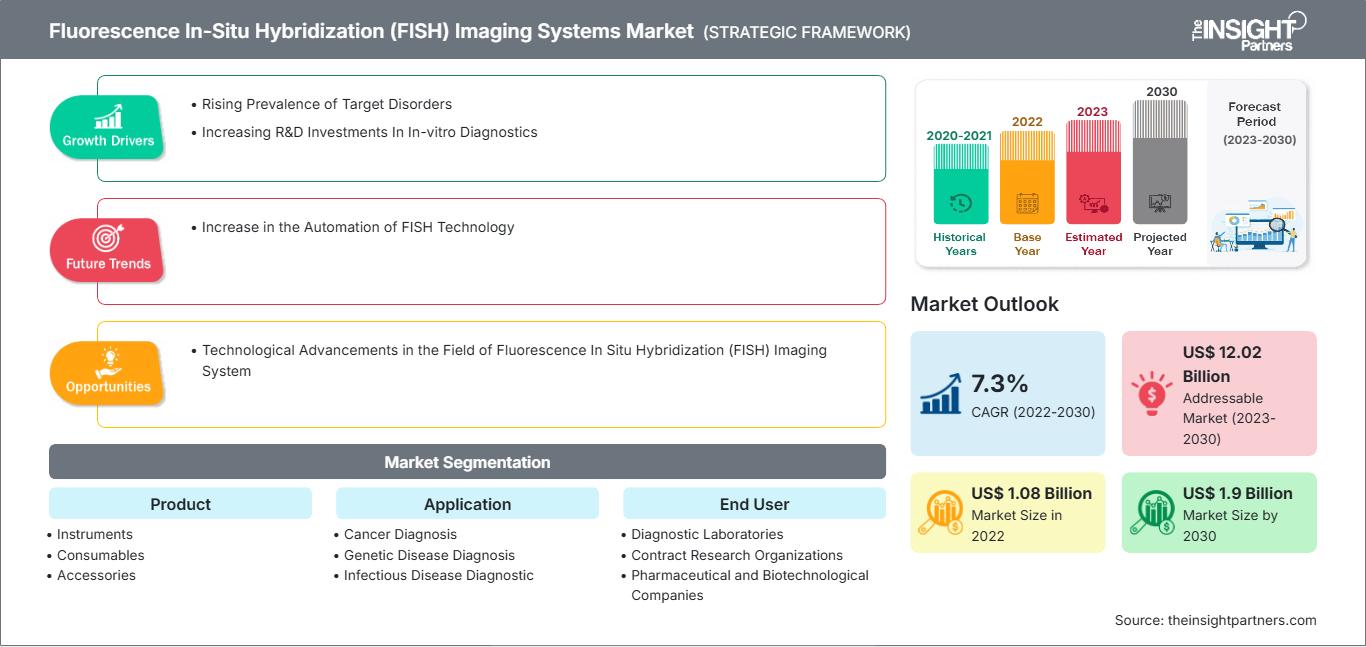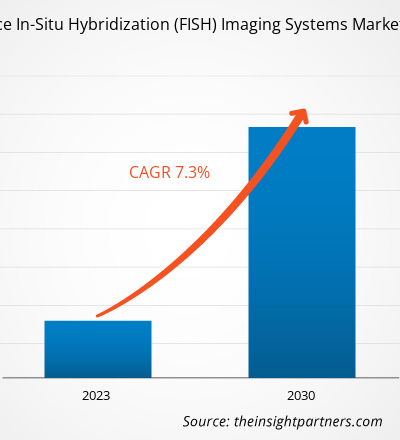[研究报告] 荧光原位杂交 (FISH) 成像系统市场预计将从 2022 年的 10.84 亿美元增长到 2030 年的 19.014 亿美元;预计 2022 年至 2030 年的复合年增长率将达到 7.3%。
市场洞察和分析师观点:
荧光原位杂交 (FISH) 是一种用于细胞遗传学分析的分子技术。该技术使用荧光探针,这些探针仅与核酸序列中具有高度序列互补性的特定部分结合。FISH 检测染色体上是否存在特定 DNA 序列。FISH 常用于在医学、遗传咨询和物种鉴定中查找 DNA/RNA 靶标中的特定特征。推动荧光原位杂交 (FISH) 成像系统市场增长的关键因素包括靶基因疾病患病率的上升以及体外诊断研发投入的增加。然而,FISH 成像系统和程序的高成本阻碍了市场的增长。
增长动力和制约因素:
FISH 是一种强大的分子细胞遗传学技术,可以可视化和定位细胞或组织内的特定 DNA 序列。这项技术彻底改变了遗传学和诊断学领域,为研究人员和临床医生提供了有关遗传异常、染色体重排和各种疾病的宝贵见解。遗传综合征、癌症和其他遗传异常等靶基因疾病患病率的不断上升推动了对 FISH 成像系统的需求。根据美国国家医学图书馆的数据,预计到2023年,美国将新增1.96例癌症病例,并有609,820例癌症死亡病例。随着这些目标疾病的患病率持续上升,对准确可靠的诊断工具的需求也随之激增。FISH成像系统提供高分辨率图像,有助于检测细微的基因变化,从而实现疾病的早期诊断和个性化治疗。这些疾病通常涉及基因突变或变异,而FISH成像系统可以准确地识别和表征这些突变或变异。精确定位细胞内特定基因或DNA序列的位置,已被证明对于理解疾病机制、开发靶向疗法和做出明智的临床决策至关重要。
FISH的一大优势在于它能够处理各种类型的样本,包括福尔马林固定石蜡包埋组织、细胞学制剂和新鲜组织。这种多功能性使 FISH 成为研究和临床环境中的重要工具,可以识别与白血病、淋巴瘤、实体瘤和先天性疾病等疾病相关的遗传标记。
自定义此报告以满足您的要求
您将免费获得任何报告的定制,包括本报告的部分内容,或国家级分析、Excel 数据包,以及为初创企业和大学提供超值优惠和折扣
荧光原位杂交(FISH)成像系统市场: 战略洞察

-
获取本报告的主要市场趋势。这个免费样本将包括数据分析,从市场趋势到估计和预测。
荧光原位杂交 (FISH) 成像系统市场受到体外诊断 (IVD) 相关研发活动持续投入的进一步推动。FISH 技术凭借其独特的在细胞环境中可视化特定 DNA 序列的能力,已成为现代诊断的关键程序,尤其是在检测遗传性疾病和罕见疾病方面。IVD 领域研发资金的激增催化了 FISH 成像系统的变革性进步,使研究人员能够创建尖端平台,提供更高质量的图像,并支持简化的自动化功能,最终实现更准确、更快速的诊断流程。 PNA FISH 是一种利用肽核酸 (PNA) 探针进行 FISH 的新型诊断方法,它将传统染色程序的便捷性与 PNA 探针的卓越性能相结合,能够快速准确地诊断传染病。这使得 PNA FISH 适合常规应用,并使临床微生物实验室能够在传统生化方法无法实现的时间内报告对患者治疗至关重要的信息。然而,由于 FISH 成像分析的成本相对较高,因此在癌症检测中不太常用。除了设备成本外,试剂、其他耗材以及专业人员的聘用费用也会增加基于 FISH 成像评估的总成本。例如,在美国,每次通过 IHC 检测 ALK 基因非小细胞肺癌的费用为 90.07 美元,在欧洲为 68.69 美元,低于通过 FISH 和 IHC 进行独立或并行检测的费用(每次检测费用在美国约为 441.85 美元,在欧洲为 279.46 美元)。因此,程序和系统的高成本限制了荧光原位杂交 (FISH) 成像系统市场的增长。
报告细分和范围:
“全球荧光原位杂交 (FISH) 成像系统市场”根据产品、应用和最终用户进行细分。根据产品,市场细分为仪器、耗材、配件和软件。就应用而言,荧光原位杂交 (FISH) 成像系统市场细分为癌症诊断、遗传病诊断、传染病诊断等。根据最终用户,市场细分为诊断实验室、合同研究组织、制药和生物技术公司等。根据地域划分,荧光原位杂交 (FISH) 成像系统市场细分为北美(美国、加拿大和墨西哥)、欧洲(德国、法国、意大利、英国、俄罗斯和欧洲其他地区)、亚太地区(澳大利亚、中国、日本、印度、韩国和亚太其他地区)、中东和非洲(南非、沙特阿拉伯、阿联酋和中东及非洲其他地区)以及南非和……中美洲(巴西、阿根廷以及南美洲和中美洲其他地区)。
分段分析:
荧光原位杂交 (FISH) 成像系统市场按产品细分为仪器、耗材、配件和软件。耗材细分市场在 2022 年占据最大市场份额,预计在 2022 年至 2030 年期间的复合年增长率最高。耗材是荧光原位杂交 (FISH) 成像系统市场中最有前景的细分市场,将在未来几年带来巨大增长。FISH 耗材包括杂交缓冲液、探针、标签检测试剂盒、信号放大检测试剂盒等。雅培、F. Abnova 和赛默飞世尔科技等制造商的存在增强了耗材细分市场的市场。这些产品经常用于各种研究诊断过程,预计将推动消费。因此,各种市场参与者提供探针和试剂盒以及市场参与者的技术进步可能会在未来几年推动该细分市场的发展。
根据应用,荧光原位杂交 (FISH) 成像系统市场细分为癌症诊断、遗传病诊断、传染病诊断等。癌症诊断细分市场在 2022 年占据最大市场份额,预计在 2022 年至 2030 年期间将实现最高复合年增长率。FISH 技术极大地促进了癌症诊断。FISH 成像系统可以寻找基因变化并帮助检测异常。根据英国癌症研究中心的数据,FISH 检测用于诊断多种癌症,包括乳腺癌、淋巴瘤、肺癌、前列腺癌、慢性淋巴细胞白血病 (CLL)、急性淋巴细胞白血病 (ALL)、急性髓细胞白血病 (AML)、慢性髓细胞白血病 (CML)、骨髓瘤、尤文氏肉瘤和黑色素瘤皮肤癌。
根据最终用户,荧光原位杂交 (FISH) 成像系统市场细分为诊断实验室、合同研究组织、制药和生物技术公司以及其他。诊断实验室部门在 2022 年占据了最大的市场份额,预计在 2022 年至 2030 年期间将实现最高的复合年增长率。诊断实验室参与各种研究项目,以开发用于荧光原位杂交 (FISH) 成像过程的多种技术和产品。研究和技术的空前发展为医疗保健和生命科学领域的变革创造了潜力。荧光原位杂交 (FISH) 成像系统的临床应用前景广阔,为提升慢性病的诊断和治疗能力提供了机遇。它们在基因发现和罕见遗传病的诊断方面展现出巨大的潜力。这些技术越来越多地用于分析影响常见疾病(例如癌症、高血压、糖尿病和肾脏疾病)发展的罕见和常见遗传因素。
区域分析:
根据地域划分,全球荧光原位杂交 (FISH) 成像系统市场分为五个主要区域:北美、欧洲、亚太地区、南美和中美以及中东和非洲。2022 年,北美在全球荧光原位杂交 (FISH) 成像系统市场规模中所占份额最大。预计亚太地区在2022年至2030年期间的复合年增长率最高。
预计美国将在预测期内占据最大的荧光原位杂交 (FISH) 成像系统市场份额。美国在北美荧光原位杂交 (FISH) 成像系统市场中占有相当大的份额。对分子遗传学和细胞遗传学先进诊断工具的需求日益增长,以及遗传疾病和癌症患病率的上升,推动了美国荧光原位杂交 (FISH) 成像系统的应用。根据美国癌症协会 (American Cancer Society) 2022年发布的数据,美国确诊了近190万例癌症病例,报告了609,360例癌症死亡病例。这些系统提供遗传物质的高分辨率成像,使研究人员和临床医生能够更准确地检测染色体异常和基因突变。此外,对个性化医疗和靶向治疗的日益关注导致涉及基因分析的研究活动激增,从而刺激了对FISH成像系统的需求。这些系统能够直接提供细胞内基因序列的详细空间信息,其在研究和临床应用中均具有不可估量的价值。FISH 成像系统近年来因其技术进步(例如自动化程度的提高、通量提升以及图像分析软件的增强)而广受欢迎。因此,实验室和医疗机构能够更好地处理大量样本,并高效地获得精确的结果。因此,对分子遗传学和细胞遗传学中先进诊断工具的需求不断增长,以及遗传疾病和癌症患病率不断上升,促进了美国荧光原位杂交 (FISH) 成像系统市场的发展。
行业发展和未来机遇:
全球荧光原位杂交 (FISH) 成像系统市场主要参与者采取的各种举措如下:
- 2023 年 5 月,辉瑞公司和赛默飞世尔科技公司合作,帮助提高拉丁美洲、非洲、中东和亚洲 30 多个国家/地区的肺癌和乳腺癌患者获得基于下一代测序 (NGS) 的检测的机会,这些国家/地区以前的先进基因组检测有限或无法获得。获得本地 NGS 检测有助于更快地分析相关基因,从而使医疗保健提供者能够为特定患者选择最佳药物。
- 2023 年 4 月,安捷伦科技公司与韩国 Theragen Bio 签署了一份谅解备忘录。作为合作协议的一部分,安捷伦和 Theragen Bio 结合各自在癌症基因组分析设计、工程知识和软件专业知识方面的优势,以推动本地化分析能力并加速治疗决策。
- 2023 年 4 月,MetaSystems Probes GmbH 推出了四种新的 XCyting New MetaSystems 探针——XL t(11;14) CCND1/IGH DF、XL CCND3/IGH DF、XL CUX1/EZH2/7cen 和 XL DiGeorge TBX1。
- 2022 年 5 月,MetaSystems Probes GmbH 为其血液学和肿瘤学产品组合推出了三种新的 XCyting 基因座特异性分离探针——XL TCL1 BA、XL SPI1 BA 和 XL CSF1R BA。 XL TCL1 BA 旨在检测在数例 T 细胞幼淋巴细胞白血病 (T-PLL) 病例中发现的涉及重排的 TCL1 基因簇位点。XL SPI1 BA 适用于检测儿童 T 细胞急性淋巴细胞白血病 (T-ALL) 病例中涉及重排的 SPI1 基因位点。XL CSF1R BA 是 ALL 高危亚群中涉及多种重排的重要基因之一,这些亚群可导致 B 细胞前体 ALL。
- 2021 年 12 月,BioGenex Laboratories Inc 推出了三种用于癌症诊断的新型一抗免疫组织化学 (IHC) 抗体——CD8A、CD56 和 CD163。
荧光原位杂交(FISH)成像系统市场区域洞察
The Insight Partners 的分析师已详尽阐述了预测期内影响荧光原位杂交 (FISH) 成像系统市场的区域趋势和因素。本节还讨论了北美、欧洲、亚太地区、中东和非洲以及南美和中美洲的荧光原位杂交 (FISH) 成像系统市场细分和地域分布。
荧光原位杂交(FISH)成像系统市场报告范围
| 报告属性 | 细节 |
|---|---|
| 市场规模 2022 | US$ 1.08 Billion |
| 市场规模 2030 | US$ 1.9 Billion |
| 全球复合年增长率 (2022 - 2030) | 7.3% |
| 历史数据 | 2020-2021 |
| 预测期 | 2023-2030 |
| 涵盖的领域 |
By 产品
|
| 覆盖地区和国家 |
北美
|
| 市场领导者和主要公司简介 |
|
荧光原位杂交 (FISH) 成像系统市场参与者密度:了解其对业务动态的影响
荧光原位杂交 (FISH) 成像系统市场正在快速增长,这得益于终端用户需求的不断增长,而这些需求的驱动因素包括消费者偏好的不断变化、技术进步以及对产品优势的认知度不断提高。随着需求的增长,企业正在扩展其产品线,不断创新以满足消费者需求,并抓住新兴趋势,从而进一步推动市场增长。

- 获取 荧光原位杂交(FISH)成像系统市场 主要参与者概述
竞争格局和主要公司:
Euroclone SpA、TissueGnostics GmbH、安捷伦科技公司、台湾上元科技有限公司、BioGenex Laboratories Inc、徕卡生物系统公司、MetaSystems Probes GmbH、Bio-View Ltd、赛默飞世尔科技公司、Applied Spectral Imaging 和珀金埃尔默公司是荧光原位杂交 (FISH) 成像系统市场的知名企业。这些公司专注于新技术、现有产品的改进和地域扩张,以满足全球不断增长的消费者需求,并扩大其专业产品组合的范围。
- 历史分析(2 年)、基准年、预测(7 年)及复合年增长率
- PEST和SWOT分析
- 市场规模、价值/数量 - 全球、区域、国家
- 行业和竞争格局
- Excel 数据集
近期报告
客户评价
购买理由
- 明智的决策
- 了解市场动态
- 竞争分析
- 客户洞察
- 市场预测
- 风险规避
- 战略规划
- 投资论证
- 识别新兴市场
- 优化营销策略
- 提升运营效率
- 顺应监管趋势






















 获取免费样品 - 荧光原位杂交(FISH)成像系统市场
获取免费样品 - 荧光原位杂交(FISH)成像系统市场